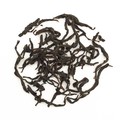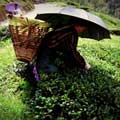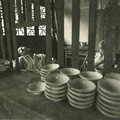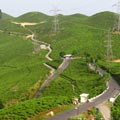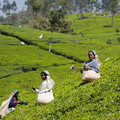Wuliang - 2013 - 3 and more stars
Tea by type
Tea by region
Tea by years and other
2013 Wuliang Wild Hongcha
 2 reviews
2 reviewsThis tea is collected from ancient, wild trees on Wuliang mountain. These are truely wild trees, that haven't been planted by humans and average around 800-1000 years old. The leaves naturally have honey like characteristics in the taste and aroma, which lends them very well to being made into hongcha (Red/Black tea). I find it difficult to get excited by many hongcha - the oxidisation often seems to mute many of the characteristics of teas that I find most enjoyable. This one...
Theme
Quotes
„Depending on the desired product and speed, from quickest and tightest to slowest and loosest, pressing can be done by a large heavy stone, carved into the shape of a short cylinder with a handle, simply weighs a bag of tea down onto a wooden board. The tension from the bag and the weight of the stone together give the tea its rounded and sometimes non-uniformed edge. Due to the manual labor involved, this method of pressing is often referred to as: "hand" or "stone-pressing", and is how many artisanal pu'er bǐng are still manufactured.“
Latest posts
01.01.2016 @ 18:14:35 - Eternal Spring:
WeRateTea.com wish you all the best for 2016!...
07.12.2015 @ 09:07:02 - sypalino:
I decided to taste this tea 2 weeks after delivery. The cake is lightly pressed, so...
09.11.2015 @ 21:58:19 - Eternal Spring:
Comparison of 2013 Bada Pu-erh.sk with <a...
09.11.2015 @ 09:34:07 - Eternal Spring:
Lao Yu 2013 is now about 2,5 years old tea and out of this 1,5 year stored in Europe....
09.11.2015 @ 09:33:11 - Eternal Spring:
Comparison of all three Lao Yu is now done :)
15.10.2015 @ 11:06:37 - Eternal Spring:
2015 Chawangpu Collection – I can only tell, that all teas are very good :)
09.10.2015 @ 10:31:19 - Eternal Spring:
It was quite long and difficult tasting to make a decision… There is still quite...
24.01.2015 @ 16:55:57 - Eternal Spring:
WeRateTea.com wish you all the best for 2015!...
30.12.2014 @ 17:19:22 - Eternal Spring:
"FT(For Taiwan)" means this brick was a special order of "Fei Tai" Company. Fei Tai...
13.08.2014 @ 18:24:28 - Eternal Spring:
We compared two teas from Youle. 2005 Jinuo Shan You Le "Red Sun Drum" and 2009...
Tea by region
We will help you with tea selection.
Do you like quality loose tea?
We will help you to find the right one for you. Be inspired by tea ratings of other tea lovers. Rating stars could help you.


Review your cup of tea.
Review the tea you are drinking and help other tea lovers to find the right cup of tea.






 Shops
Shops
